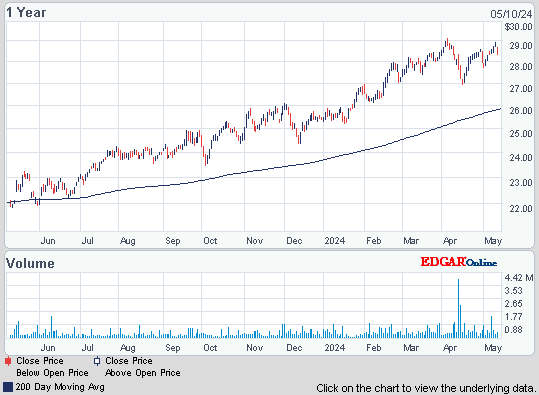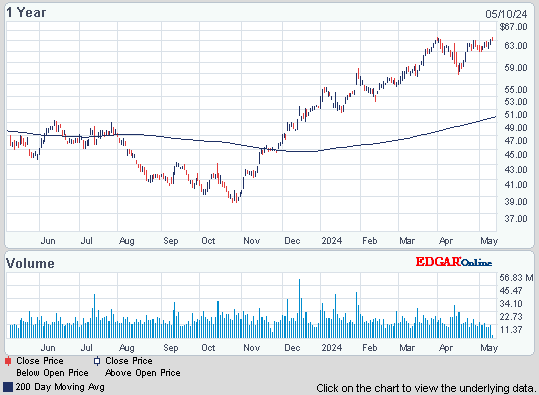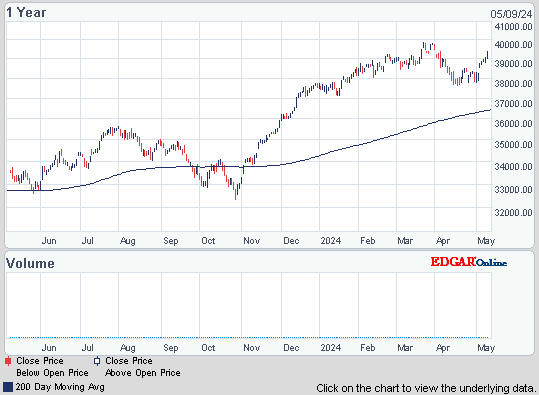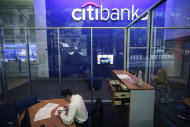Dow gained 63 although off its best levels, decliners just ahead of advancers & NAZ slumped 18, hurt by a drop of 11 (to 594) at Apple (AAPL). The Financial Index was up 1 to the 204s. The MLP index fell a fraction to 387 & the REIT index went up 1+ to almost 250. Junk bond funds were higher & Treasuries rose on more uncertainty about Spanish debt. Oil & gold did little.


Bank of Spain
Photo: Bloomberg
Spain's debt yields broke above 6% as investors worried about its budget, knocking the € & sending safe-haven German bonds to a record last set at the height of the euro zone crisis. Mixed signals from the ECB over its willingness to help the market by restarting a special bond buying program & news Spanish banks have been heavy borrowers of cheap ECB funds also undermined confidence. Spain's 10-year bonds were up 16 basis points at 6.15%, 5-year yields topped 5%, while 2-year yields spiked to 3.7%, all highs for this year. 6% was last reached in Dec & is psychologically important for markets. The rise typically accelerates after that level, putting yields on course for 7% beyond which debt costs are seen as unsustainable. The cost of insuring Spanish debt against default also hit record highs in early trading. Contagion fears also pushed Italian 10-year bonds higher. European officials are traveling to DC seeking a bigger global war chest to combat the debt crisis to help Spain's gov battle market turmoil over its finances. Can you spell, "Greece II?"
Euro Area Seeks Bigger IMF War Chest on Spanish Concerns
The outlook for homebuilders dimmed in Apr after 6 months of rising or steady confidence, suggesting the housing market remains weak despite modest gains. The National Association of Home Builders/Wells Fargo builder sentiment index fell this month to 25 from 28. Last month's reading was the highest since Jun 2007. The index rose for 5 straight months between Sep & Feb. Builders expressed weaker confidence in sales over the next 6 months. A separate gauge measuring that outlook rose for 6 straight months before falling this month, from 35 to 32. Any reading below 50 indicates negative sentiment about the housing market & the index hasn't reached hit that level in 6 years. The spring buying season got an early start thanks to a mild Jan & Feb, which made up the best winter for sales of previously occupied homes in 5 years. Permits to build houses & apartments rose in Feb to their highest level since 2008. But home prices continued to fall as builders keep slashing their prices to stay competitive. Last year was the worst for new-home sales on records dating back to 1963.
U.S. Homebuilder Outlook Dips Below 4-Year High
Photo: Yahoo
Citigroup made $2.9B in Q1, helped by record revenue from processing transactions for its intl clients & more customers paying back loans on time. EPS was 95¢, short of the $1.01 expected. The bank pointed to a separate figure for EPS, $1.11 per share, that does not include a $1.3B accounting charge that Citi took because the value of its debt increased. Revenue was $19.4B, down 2% from a year earlier. Citi took advantage of increased intl trade & its intl transaction services had quarterly revenue of $2.7B, up 7% from last year. Because more customers paid on time, the bank took a profit of $1.2B from reversing reserves it had set aside for loan losses. Customer loans late by at least 90 days, including credit card payments, fell 19% from a year ago. But investment banking revenue fell 12% to $5.3B because volume in the stock market has been light this year . Citi's equity markets revenue fell 18%. Q1 results continued a stream of profits in the past 2 years, which gave CEO Vikram Pandit enough confidence to promise shareholders a higher div. However, in a setback, the Federal Reserve said Citi, unlike most of its peers, did not have enough capital to raise its div & still withstand a financial crisis worse than 2008. On these mixed kind of earnings, the stock rose 76¢.
Citigroup Shares Advance as Bank’s Bond-Trading Revenue More Than Doubles

Last week was weak & this week began in a sluggish fashion. Bank earnings are coming in wishy-washy. Gains from reversing provisions for bad debts are only temporary. The rest of the story is inconclusive. AAPL is down a whopping 50 from its highs set a week ago, not a positive sign for the markets. The European debt mess is flaring up again & slower growth for China are nagging worries which are keeping buyers away. This week should bring more earnings reports, but expectations are not high. Markets are on defense.

JPMorgan Chase Capital XVI (AMJ)
Treasury yields:
U.S. 3-month | 0.081% | |
U.S. 2-year | 0.270% | |
U.S. 10-year | 1.960% |
| CLK12.NYM | ..Crude Oil May 12 | ...102.81 | ... | (0.0%) |
| GCJ12.CMX | ...Gold Apr 12 | .........1,654.50 | ... | (0.3%) |
Get the latest daily market update below:

Photo: Bloomberg
Spain's debt yields broke above 6% as investors worried about its budget, knocking the € & sending safe-haven German bonds to a record last set at the height of the euro zone crisis. Mixed signals from the ECB over its willingness to help the market by restarting a special bond buying program & news Spanish banks have been heavy borrowers of cheap ECB funds also undermined confidence. Spain's 10-year bonds were up 16 basis points at 6.15%, 5-year yields topped 5%, while 2-year yields spiked to 3.7%, all highs for this year. 6% was last reached in Dec & is psychologically important for markets. The rise typically accelerates after that level, putting yields on course for 7% beyond which debt costs are seen as unsustainable. The cost of insuring Spanish debt against default also hit record highs in early trading. Contagion fears also pushed Italian 10-year bonds higher. European officials are traveling to DC seeking a bigger global war chest to combat the debt crisis to help Spain's gov battle market turmoil over its finances. Can you spell, "Greece II?"
Euro Area Seeks Bigger IMF War Chest on Spanish Concerns
The outlook for homebuilders dimmed in Apr after 6 months of rising or steady confidence, suggesting the housing market remains weak despite modest gains. The National Association of Home Builders/Wells Fargo builder sentiment index fell this month to 25 from 28. Last month's reading was the highest since Jun 2007. The index rose for 5 straight months between Sep & Feb. Builders expressed weaker confidence in sales over the next 6 months. A separate gauge measuring that outlook rose for 6 straight months before falling this month, from 35 to 32. Any reading below 50 indicates negative sentiment about the housing market & the index hasn't reached hit that level in 6 years. The spring buying season got an early start thanks to a mild Jan & Feb, which made up the best winter for sales of previously occupied homes in 5 years. Permits to build houses & apartments rose in Feb to their highest level since 2008. But home prices continued to fall as builders keep slashing their prices to stay competitive. Last year was the worst for new-home sales on records dating back to 1963.
U.S. Homebuilder Outlook Dips Below 4-Year High
Photo: Yahoo
Citigroup made $2.9B in Q1, helped by record revenue from processing transactions for its intl clients & more customers paying back loans on time. EPS was 95¢, short of the $1.01 expected. The bank pointed to a separate figure for EPS, $1.11 per share, that does not include a $1.3B accounting charge that Citi took because the value of its debt increased. Revenue was $19.4B, down 2% from a year earlier. Citi took advantage of increased intl trade & its intl transaction services had quarterly revenue of $2.7B, up 7% from last year. Because more customers paid on time, the bank took a profit of $1.2B from reversing reserves it had set aside for loan losses. Customer loans late by at least 90 days, including credit card payments, fell 19% from a year ago. But investment banking revenue fell 12% to $5.3B because volume in the stock market has been light this year . Citi's equity markets revenue fell 18%. Q1 results continued a stream of profits in the past 2 years, which gave CEO Vikram Pandit enough confidence to promise shareholders a higher div. However, in a setback, the Federal Reserve said Citi, unlike most of its peers, did not have enough capital to raise its div & still withstand a financial crisis worse than 2008. On these mixed kind of earnings, the stock rose 76¢.
Citigroup Shares Advance as Bank’s Bond-Trading Revenue More Than Doubles
Citigroup Inc. (C)
Last week was weak & this week began in a sluggish fashion. Bank earnings are coming in wishy-washy. Gains from reversing provisions for bad debts are only temporary. The rest of the story is inconclusive. AAPL is down a whopping 50 from its highs set a week ago, not a positive sign for the markets. The European debt mess is flaring up again & slower growth for China are nagging worries which are keeping buyers away. This week should bring more earnings reports, but expectations are not high. Markets are on defense.
Dow Industrials
Get your favorite symbols' Trend Analysis TODAY!



No comments:
Post a Comment